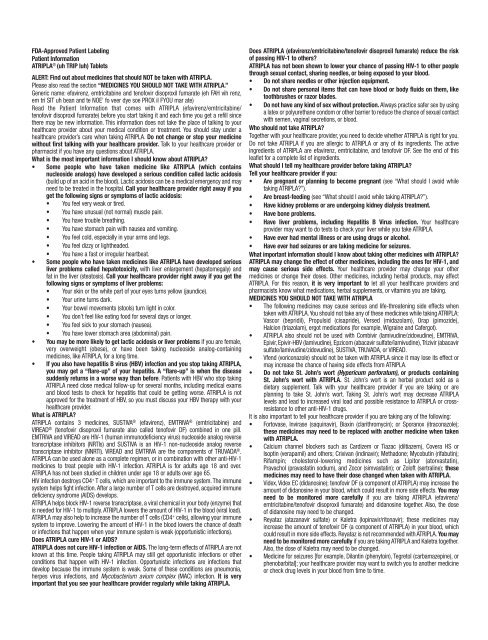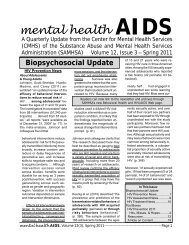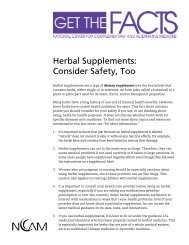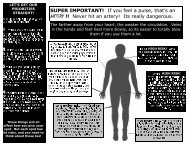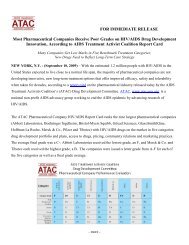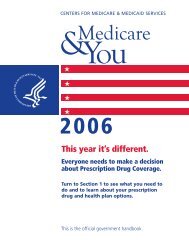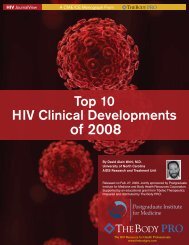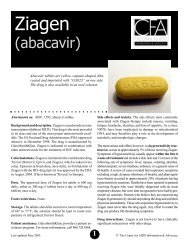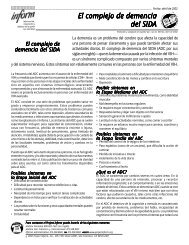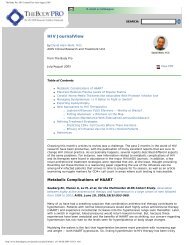WELLNESS STARTS WITH AWARENESS - CD8 T cells - The Body
WELLNESS STARTS WITH AWARENESS - CD8 T cells - The Body
WELLNESS STARTS WITH AWARENESS - CD8 T cells - The Body
You also want an ePaper? Increase the reach of your titles
YUMPU automatically turns print PDFs into web optimized ePapers that Google loves.
FDA-Approved Patient Labeling<br />
Patient Information<br />
ATRIPLA ® (uh TRIP luh) Tablets<br />
ALERT: Find out about medicines that should NOT be taken with ATRIPLA.<br />
Please also read the section “MEDICINES YOU SHOULD NOT TAKE <strong>WITH</strong> ATRIPLA.”<br />
Generic name: efavirenz, emtricitabine and tenofovir disoproxil fumarate (eh FAH vih renz,<br />
em tri SIT uh bean and te NOE’ fo veer dye soe PROX il FYOU mar ate)<br />
Read the Patient Information that comes with ATRIPLA (efavirenz/emtricitabine/<br />
tenofovir disoproxil fumarate) before you start taking it and each time you get a refill since<br />
there may be new information. This information does not take the place of talking to your<br />
healthcare provider about your medical condition or treatment. You should stay under a<br />
healthcare provider’s care when taking ATRIPLA. Do not change or stop your medicine<br />
without first talking with your healthcare provider. Talk to your healthcare provider or<br />
pharmacist if you have any questions about ATRIPLA.<br />
What is the most important information I should know about ATRIPLA?<br />
• Some people who have taken medicine like ATRIPLA (which contains<br />
nucleoside analogs) have developed a serious condition called lactic acidosis<br />
(build up of an acid in the blood). Lactic acidosis can be a medical emergency and may<br />
need to be treated in the hospital. Call your healthcare provider right away if you<br />
get the following signs or symptoms of lactic acidosis:<br />
• You feel very weak or tired.<br />
• You have unusual (not normal) muscle pain.<br />
• You have trouble breathing.<br />
• You have stomach pain with nausea and vomiting.<br />
• You feel cold, especially in your arms and legs.<br />
• You feel dizzy or lightheaded.<br />
• You have a fast or irregular heartbeat.<br />
• Some people who have taken medicines like ATRIPLA have developed serious<br />
liver problems called hepatotoxicity, with liver enlargement (hepatomegaly) and<br />
fat in the liver (steatosis). Call your healthcare provider right away if you get the<br />
following signs or symptoms of liver problems:<br />
• Your skin or the white part of your eyes turns yellow (jaundice).<br />
• Your urine turns dark.<br />
• Your bowel movements (stools) turn light in color.<br />
• You don’t feel like eating food for several days or longer.<br />
• You feel sick to your stomach (nausea).<br />
• You have lower stomach area (abdominal) pain.<br />
• You may be more likely to get lactic acidosis or liver problems if you are female,<br />
very overweight (obese), or have been taking nucleoside analog-containing<br />
medicines, like ATRIPLA, for a long time.<br />
• If you also have hepatitis B virus (HBV) infection and you stop taking ATRIPLA,<br />
you may get a “flare-up” of your hepatitis. A “flare-up” is when the disease<br />
suddenly returns in a worse way than before. Patients with HBV who stop taking<br />
ATRIPLA need close medical follow-up for several months, including medical exams<br />
and blood tests to check for hepatitis that could be getting worse. ATRIPLA is not<br />
approved for the treatment of HBV, so you must discuss your HBV therapy with your<br />
healthcare provider.<br />
What is ATRIPLA?<br />
ATRIPLA contains 3 medicines, SUSTIVA ® (efavirenz), EMTRIVA ® (emtricitabine) and<br />
VIREAD ® (tenofovir disoproxil fumarate also called tenofovir DF) combined in one pill.<br />
EMTRIVA and VIREAD are HIV-1 (human immunodeficiency virus) nucleoside analog reverse<br />
transcriptase inhibitors (NRTIs) and SUSTIVA is an HIV-1 non-nucleoside analog reverse<br />
transcriptase inhibitor (NNRTI). VIREAD and EMTRIVA are the components of TRUVADA ® .<br />
ATRIPLA can be used alone as a complete regimen, or in combination with other anti-HIV-1<br />
medicines to treat people with HIV-1 infection. ATRIPLA is for adults age 18 and over.<br />
ATRIPLA has not been studied in children under age 18 or adults over age 65.<br />
HIV infection destroys CD4 + T <strong>cells</strong>, which are important to the immune system. <strong>The</strong> immune<br />
system helps fight infection. After a large number of T <strong>cells</strong> are destroyed, acquired immune<br />
deficiency syndrome (AIDS) develops.<br />
ATRIPLA helps block HIV-1 reverse transcriptase, a viral chemical in your body (enzyme) that<br />
is needed for HIV-1 to multiply. ATRIPLA lowers the amount of HIV-1 in the blood (viral load).<br />
ATRIPLA may also help to increase the number of T <strong>cells</strong> (CD4 + <strong>cells</strong>), allowing your immune<br />
system to improve. Lowering the amount of HIV-1 in the blood lowers the chance of death<br />
or infections that happen when your immune system is weak (opportunistic infections).<br />
Does ATRIPLA cure HIV-1 or AIDS?<br />
ATRIPLA does not cure HIV-1 infection or AIDS. <strong>The</strong> long-term effects of ATRIPLA are not<br />
known at this time. People taking ATRIPLA may still get opportunistic infections or other<br />
conditions that happen with HIV-1 infection. Opportunistic infections are infections that<br />
develop because the immune system is weak. Some of these conditions are pneumonia,<br />
herpes virus infections, and Mycobacterium avium complex (MAC) infection. It is very<br />
important that you see your healthcare provider regularly while taking ATRIPLA.<br />
Does ATRIPLA (efavirenz/emtricitabine/tenofovir disoproxil fumarate) reduce the risk<br />
of passing HIV-1 to others?<br />
ATRIPLA has not been shown to lower your chance of passing HIV-1 to other people<br />
through sexual contact, sharing needles, or being exposed to your blood.<br />
• Do not share needles or other injection equipment.<br />
• Do not share personal items that can have blood or body fluids on them, like<br />
toothbrushes or razor blades.<br />
• Do not have any kind of sex without protection. Always practice safer sex by using<br />
a latex or polyurethane condom or other barrier to reduce the chance of sexual contact<br />
with semen, vaginal secretions, or blood.<br />
Who should not take ATRIPLA?<br />
Together with your healthcare provider, you need to decide whether ATRIPLA is right for you.<br />
Do not take ATRIPLA if you are allergic to ATRIPLA or any of its ingredients. <strong>The</strong> active<br />
ingredients of ATRIPLA are efavirenz, emtricitabine, and tenofovir DF. See the end of this<br />
leaflet for a complete list of ingredients.<br />
What should I tell my healthcare provider before taking ATRIPLA?<br />
Tell your healthcare provider if you:<br />
• Are pregnant or planning to become pregnant (see “What should I avoid while<br />
taking ATRIPLA?”).<br />
• Are breast-feeding (see “What should I avoid while taking ATRIPLA?”).<br />
• Have kidney problems or are undergoing kidney dialysis treatment.<br />
• Have bone problems.<br />
• Have liver problems, including Hepatitis B Virus infection. Your healthcare<br />
provider may want to do tests to check your liver while you take ATRIPLA.<br />
• Have ever had mental illness or are using drugs or alcohol.<br />
• Have ever had seizures or are taking medicine for seizures.<br />
What important information should I know about taking other medicines with ATRIPLA?<br />
ATRIPLA may change the effect of other medicines, including the ones for HIV-1, and<br />
may cause serious side effects. Your healthcare provider may change your other<br />
medicines or change their doses. Other medicines, including herbal products, may affect<br />
ATRIPLA. For this reason, it is very important to let all your healthcare providers and<br />
pharmacists know what medications, herbal supplements, or vitamins you are taking.<br />
MEDICINES YOU SHOULD NOT TAKE <strong>WITH</strong> ATRIPLA<br />
• <strong>The</strong> following medicines may cause serious and life-threatening side effects when<br />
taken with ATRIPLA. You should not take any of these medicines while taking ATRIPLA:<br />
Vascor (bepridil), Propulsid (cisapride), Versed (midazolam), Orap (pimozide),<br />
Halcion (triazolam), ergot medications (for example, Wigraine and Cafergot).<br />
• ATRIPLA also should not be used with Combivir (lamivudine/zidovudine), EMTRIVA,<br />
Epivir, Epivir-HBV (lamivudine), Epzicom (abacavir sulfate/lamivudine),Trizivir (abacavir<br />
sulfate/lamivudine/zidovudine), SUSTIVA, TRUVADA, or VIREAD.<br />
• Vfend (voriconazole) should not be taken with ATRIPLA since it may lose its effect or<br />
may increase the chance of having side effects from ATRIPLA.<br />
• Do not take St. John’s wort (Hypericum perforatum), or products containing<br />
St. John’s wort with ATRIPLA. St. John’s wort is an herbal product sold as a<br />
dietary supplement. Talk with your healthcare provider if you are taking or are<br />
planning to take St. John’s wort. Taking St. John’s wort may decrease ATRIPLA<br />
levels and lead to increased viral load and possible resistance to ATRIPLA or crossresistance<br />
to other anti-HIV-1 drugs.<br />
It is also important to tell your healthcare provider if you are taking any of the following:<br />
• Fortovase, Invirase (saquinavir), Biaxin (clarithromycin); or Sporanox (itraconazole);<br />
these medicines may need to be replaced with another medicine when taken<br />
with ATRIPLA.<br />
• Calcium channel blockers such as Cardizem or Tiazac (diltiazem), Covera HS or<br />
Isoptin (verapamil) and others; Crixivan (indinavir); Methadone; Mycobutin (rifabutin);<br />
Rifampin; cholesterol-lowering medicines such as Lipitor (atorvastatin),<br />
Pravachol (pravastatin sodium), and Zocor (simvastatin); or Zoloft (sertraline); these<br />
medicines may need to have their dose changed when taken with ATRIPLA.<br />
• Videx, Videx EC (didanosine); tenofovir DF (a component of ATRIPLA) may increase the<br />
amount of didanosine in your blood, which could result in more side effects. You may<br />
need to be monitored more carefully if you are taking ATRIPLA (efavirenz/<br />
emtricitabine/tenofovir disoproxil fumarate) and didanosine together. Also, the dose<br />
of didanosine may need to be changed.<br />
• Reyataz (atazanavir sulfate) or Kaletra (lopinavir/ritonavir); these medicines may<br />
increase the amount of tenofovir DF (a component of ATRIPLA) in your blood, which<br />
could result in more side effects. Reyataz is not recommended with ATRIPLA. You may<br />
need to be monitored more carefully if you are taking ATRIPLA and Kaletra together.<br />
Also, the dose of Kaletra may need to be changed.<br />
• Medicine for seizures [for example, Dilantin (phenytoin), Tegretol (carbamazepine), or<br />
phenobarbital]; your healthcare provider may want to switch you to another medicine<br />
or check drug levels in your blood from time to time.


